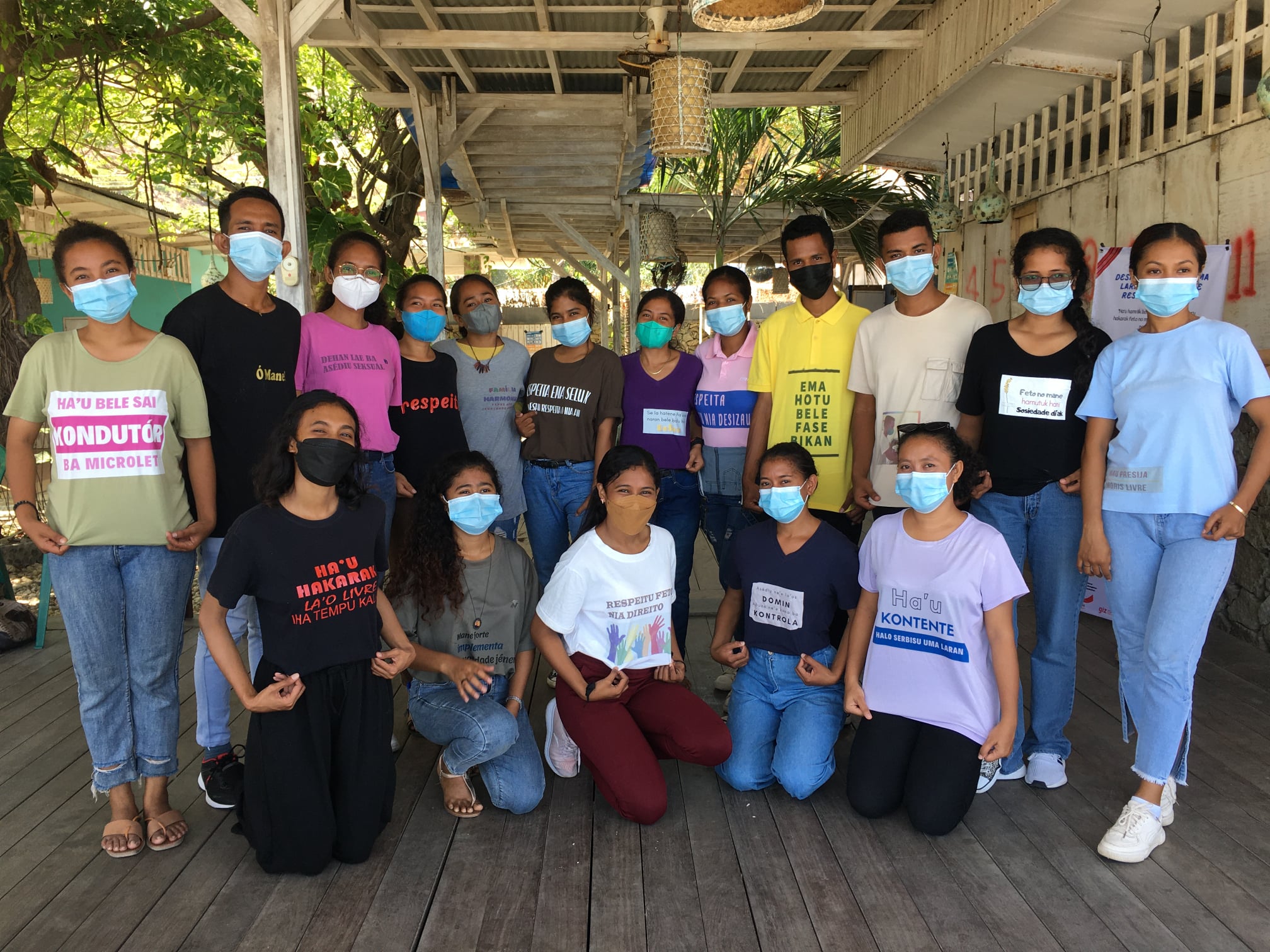
Meet JDN’s advocates who will work to challenge sexual harassment and make public spaces safe and inclusive for women in Timor-Leste.
In August, the indigo foundation board approved an important new partnership in Timor-Leste, working with a local organisation called Juventude Ba Dezenvolvimentu Nasionál (JDN) – Young People for National Development.
JDN is a dynamic youth-led, community-based organisation. It was established in 2014 when a group of young people aged 17 – 24 years came together to discuss the issues impacting their lives. JDN engages young people in discussion and action on those issues, as well as building the leadership capacity of young people so they can contribute to nation-building in Timor-Leste. We’ll be partnering with JDN to help them take action on one of their key priorities – working with young women and men to stand up to sexual harassment and discrimination against women and girls at home, in public spaces and on public transport.
Meet JDN, a thriving youth-led organisation
JDN has an active membership of over 200 young people and their programs are identified, designed and delivered by young people. They work across a number of issues, including education programs for women on nutrition, vaccine promotion and public health measures to prevent Covid-19, small income generating activities and sexual and reproductive health. JDN writes “Everything we do aims to build the skills, knowledge and capacity of JDN members and other young people who participate in projects organised by JDN.”
Timor-Leste has one of the youngest populations in the Asia Pacific and building a strong youth voice is vital to JDN. Despite the country’s impressive progress since gaining independence in 2002, Timor-Leste remains one of the most economically disadvantaged countries in South East Asia. According to the most recent census in 2015, 60.7% of the total population is under 25 years.1 Youth unemployment and disadvantage is a critical issue and there are limited industries in which young people can find employment. The economic outlook for young people has been challenged further this year by the pandemic and Cyclone Seroja, which caused widespread landslides in April.
One of the key concerns raised by the young people that JDN works with is gender-based violence and harassment. According to the Nabilan Health and Life Experiences Study into
intimate partner violence in Timor-Leste, 59% of women aged 15 – 49 who have been in a relationship reported having experienced some form of physical or sexual partner violence.2 JDN writes “In Timor-Leste young women are treated unequally and often discriminated against by men. There are many issues facing young women and sexual harassment is one of those. Here in Timor, people regard sexual harassment as a normal behaviour but in fact it is wrong and it is a disrespectful behaviour towards women and it happens everywhere. As a youth organisation, we want to help and encourage young women to recognise that this issue is a bad action that can affect the woman’s rights and life as well.”
Over the past 12 months, JDN has collected case studies from 80 young women to understand the different ways in which they experience violence and harassment, in the home, in public and particularly on Timor Leste’s common public transport modes – microlet and taxi.
Building collectives of young people to make public spaces safer and more inclusive
“We want women to live in a fairer society where there is no discrimination against them. We also want young women to be safe when using public transportation and walking on the street. We believe that young women can become activists on this issue in Timor-Leste”, JDN
JDN have put forward a three-year plan to build a movement of young women and men who will take action to make public spaces safer, challenge gender stereotypes and reduce the incidence of sexual harassment. They want to support young women to understand their rights and develop skills and confidence to stand up to sexual harassment and discrimination. And they want to advocate for systems change, stronger regulation and training of drivers in public transport. JDN will do this through “education, life skills training, responsive actions and advocacy”. In the first year this includes:
- Running 10 workshops and setting up support structures including online chat rooms, WhatsApp groups and face-to-face gatherings to share experiences and take action.
- Establishing a network of Young Women’s Advocacy Groups to push for the implementation of a Code of Conduct for microlet drivers.
- Engaging young men as advocates for change.
They expect that running this project in and of itself will build the skills and leadership of the young people involved. We are working with JDN to ensure they have baseline data to track their impact.
indigo foundation knows that development and attitude change is never a straight-forward path – it is often messy with diversions and challenges. We commit to our local partners for the long-term, as they face inevitable setbacks and celebrate wins. Our goal is to build capacity to a point they no longer need our support. In line with our usual approach to new partnerships, we’ve made an initial commitment to JDN for 12 months to test the relationship and build trust. We hope that this work with JDN will develop into a longer-term partnership.
Looking to the future
In some ways, for us at indigo foundation, partnering with JDN feels like we are coming full circle. One of our earliest partnerships from 2002 – 2005 was in Timor-Leste, with a women-led organisation, Centro Feto, that worked in Oecusse enclave to support a refuge and counselling service for women experiencing domestic violence. We are thrilled to be embarking on this new partnership with JDN and are excited about what lies ahead.
We thank and acknowledge the Blue Mountains East Timor Sisters and Jude Finch, a member of our Development Committee, who introduced us to JDN.
